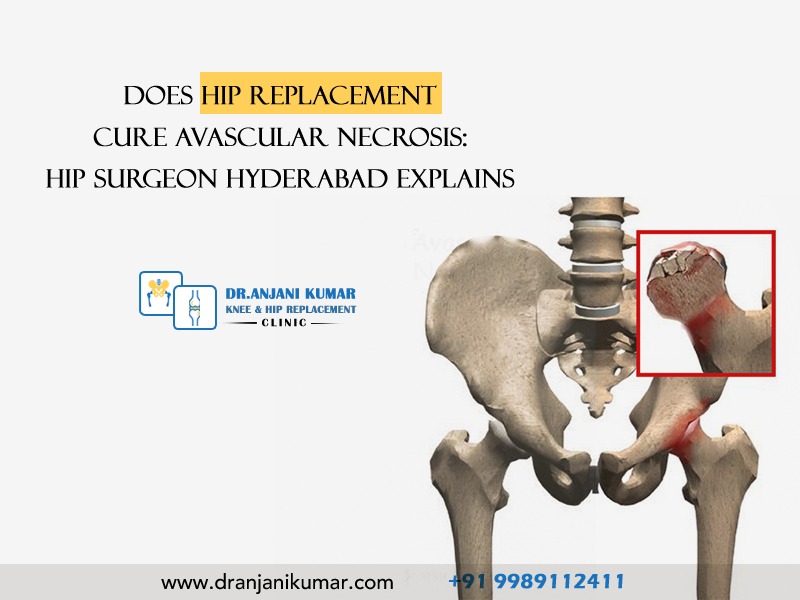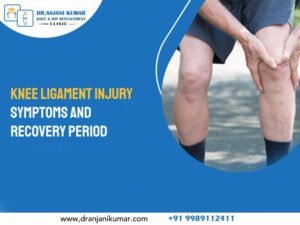Avascular necrosis (AVN) is a condition causing bone tissue to die due to compromised blood supply to the hip joint, causing pain, limited mobility, and joint collapse. Hip replacement surgery, also known as hip arthroplasty, replaces damaged or diseased parts with artificial components to relieve pain, restore mobility, and improve quality of life for severe hip joint problems. However, hip replacement is not a cure for AVN, as it involves the underlying bone. Early-stage AVN can be managed with medication, physical therapy, and lifestyle changes. If AVN has progressed significantly and caused significant joint damage, a hip replacement may be recommended to relieve pain and restore function. Consult a qualified orthopaedic surgeon specializing in hip conditions like AVN for personalized advice based on medical history, AVN stage, and overall health.

AVN cure with hip replacement:
Hip replacement surgery can relieve pain and restore mobility in avascular necrosis (AVN) cases, but it is not a cure. AVN is caused by disruption of blood supply to the bone, leading to bone tissue death. The surgery removes damaged bone and replaces it with artificial components to restore joint function, but it does not address impaired blood supply. Hip replacement surgery aims to alleviate pain, improve joint function, and enhance the patient’s quality of life. By replacing damaged joint surfaces with prosthetic components, the surgery helps individuals regain mobility and reduce pain, providing significant benefits for those suffering from AVN-related pain and joint deterioration.
AVN affects not only the joint surface but also the underlying bone. Hip replacement surgery replaces damaged bone with artificial materials but doesn’t restore compromised blood supply. Symptoms of AVN can be improved, but impaired blood flow may still be present. Individuals considering hip replacement should consult a skilled orthopaedic surgeon to evaluate the severity of AVN, joint damage, and overall health. Hip replacement surgery may be the best option for pain relief and improved function, but it may not completely cure the underlying condition.
The best treatment recommended by Hyderabad hip surgeons:
The optimal treatment for hip avascular necrosis depends on factors like the condition’s stage, damage extent, patient’s health, and individual preferences. Treatment options include conservative approaches and surgical interventions. Consult a qualified orthopaedic specialist to determine the most suitable plan for your case.
- Conservative management:
- In the early stages of AVN, conservative approaches might be recommended when there is minimal joint damage.
- Pain management with over-the-counter or prescription medications.
- Lifestyle modifications include weight loss, avoiding high-impact activities, and using assistive devices like crutches or walkers.
- Physical therapy to maintain joint range of motion, strengthen muscles, and improve joint function.
- Medications:
- Bisphosphonates or other medications slow down bone loss and improve bone density, potentially delaying the progression of AVN.
- Core decompression:
- This surgical procedure involves removing a portion of the bone from the affected area to relieve pressure and improve blood flow.
- It’s most effective in the early stages of AVN and when the necrotic area is limited.
- Vascularized bone grafting:
- This procedure involves transplanting bone and its blood vessels to the area of necrosis.
- It aims to enhance blood supply to the affected bone and promote new bone growth.
- Total hip replacement(arthroplasty):
- A total hip replacement surgery might be recommended in advanced cases with significant joint damage and pain.
- The damaged hip joint is replaced with artificial components (prosthesis) to restore function and alleviate pain.
- There are different hip replacement surgeries, including traditional and minimally invasive approaches.
- Osteotomy:
- If AVN has led to joint misalignment or abnormal stress, an osteotomy might be performed to reposition the bone and reduce stress on the affected area.
Treatment for AVN depends on the severity, hip joint condition, overall health, and personal preferences. An orthopaedic surgeon evaluates the case and discusses the benefits, risks, and potential outcomes. Early intervention is crucial for managing AVN, preventing further damage and improving long-term outcomes.
Most common causes and reasons for avascular necrosis:
Avascular necrosis, also known as osteonecrosis, occurs when the blood supply to a bone is disrupted, causing bone tissue death and causing bone collapse and joint damage.
Common causes include inflammation, infection, and risk factors:
- Trauma:
- Traumatic injuries, such as fractures or dislocations, can damage blood vessels and disrupt blood flow to the bone, leading to AVN.
- Steroids use:
- Long-term and high-dose use of corticosteroids, often prescribed for conditions like autoimmune disorders, asthma, and certain inflammatory conditions, can increase the risk of AVN.
- Steroids can impair blood supply and affect bone health.
- Alcohol abuser:
- Excessive alcohol consumption can weaken bones and affect blood circulation, increasing the risk of AVN.
- Alcohol-induced bone changes can contribute to the development of AVN.
- Medical conditions: Medical conditions can increase the risk of AVN:
- Sickle cell disease: Genetic disorder affects blood cell shape and function, causing impaired blood flow and increased AVN risk.
- Lupus: Autoimmunity disorders like SLE increase AVN risk by affecting blood vessels.
- HIV: HIV patients face an increased risk of AVN due to the virus’s impact on blood vessels and bone health.
- Cushing’s syndrome: A hormonal disorder may lead to elevated cortisol levels, potentially affecting AVN development.

- Joint diseases:
- Rheumatoid arthritis increases AVN risk due to inflammation and blood vessel damage.
- Blood disorders:
- Blood clotting disorders cause vessel blockages, reducing bone supply and causing AVN.
- Radiation therapy:
- High-dose radiation therapy can cause AVN by damaging blood vessels and compromising bone flow.
- Organ transplant:
- Organ transplant recipients and immunosuppressive medications may increase the risk of developing AVN due to blood supply and bone health issues.
- Excessive weight-bearing or pressure:
- Increased bone pressure, like intraosseous or weight-bearing, disrupts blood flow and contributes to AVN.
- Age groups:
- AVN affects individuals aged 30-60 but can also occur in younger individuals, especially when linked to underlying conditions.
- Corticosteroid users:
- People who take high doses of corticosteroid medications for prolonged periods, often for conditions like autoimmune diseases, asthma, or inflammatory conditions, are at an increased risk of AVN.
- Corticosteroids can impair blood flow and bone health, leading to AVN.
- People with blood clotting disorders:
- Certain blood clotting disorders and coagulation abnormalities can lead to blood vessel blockages, reducing blood supply to the bone and causing AVN.
AVN can occur in individuals without risk factors or risk factors. If you suspect or are at risk, consult a medical professional for evaluation, diagnosis, and management. Early detection and intervention can prevent further damage and improve outcomes. Common causes and risk factors vary, but AVN’s impact on bone health and joint function can be mitigated through proper care and early detection.
About Dr Anjani Kumar
As an orthopaedic surgeon in Hyderabad, I try to provide patients with as many options as possible for hip and knee treatments to help each patient have the greatest results. I carefully consider the specific sorts of injuries and need to be comfortable offering a specialised solution before recommending the best course of therapy for each patient. My patients’ enhanced mobility and pain reduction are always my top priorities, as these will enable them to resume an active lifestyle. In more severe cases, especially when the joint has collapsed, or the bone has suffered extensive deformation, knee replacement surgery may be advised.
Knee replacement surgery may be recommended in advanced cases, especially if the joint has collapsed or the bone has become severely deformed.
Dr Anjani Kumar has 20 years of experience and successfully performed 2000 knee replacement surgeries, 350 hip replacement surgeries, and 500 pelvic acetabular surgeries throughout his career. Please get in touch with us on Mobile: at +91 9989112411 and by E-mail: anjanikumar@ gmail.com




